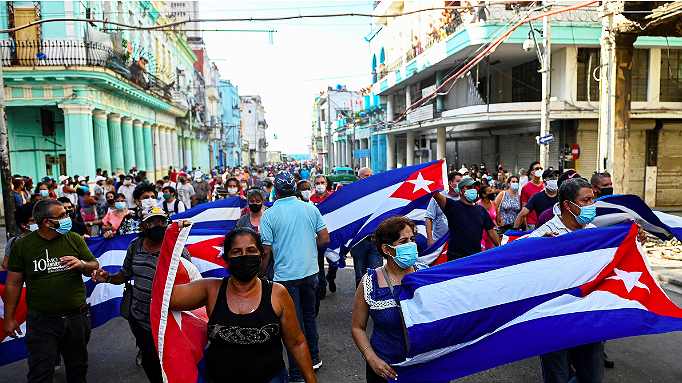
Case study: Experiencing a shutdown in Cuba during protests
In July 2021, Cuba saw the largest protests in more than 100 years taking place throughout the country. Cubans flooded the streets to demand better access to food, water, medicine, and COVID-19 vaccines, calling for government reforms.
The first protest took place in a small town out of Havana called San Antonio de los Baros. The unrest was live-streamed on Facebook and had a domino effect throughout the country.
As people started to protest around Cuba, the government initially cut off the internet for 24 hours in order to block live broadcasts. Shortly afterward they started blocking social media platforms, like Facebook, Twitter, and YouTube. The shutdown extended to blocking apps and VPNs.
ETECSA, the only internet service provider in the country, is owned by the government — which made stopping the flow of communications extremely straightforward.
But this act of digital authoritarianism by the Cuban government was not the first of its kind. Activists have been listed by the government and together with the telecommunication company they cut off their phones.
In this video case study, Norges Rodríguez director of YucaByte talks about Cuba’s internet shutdowns during these protests, how international organisations help civil society in Cuba through training in digital security, and how to use tools to measure internet censorship. We also hear how they’re building networks on a regional level.
The creation of our Shutdown Academy resulted from the increasing number of government-ordered internet shutdowns worldwide, like the one mentioned above in Cuba. According to Access Now, in 2021 there were 182 internet shutdowns in 32 countries around the globe. This trend has only been growing over the past decade. With throttling, blockages, and internet blackouts on the rise worldwide, people affected needed all the necessary tools to fight back.
Our latest course by Access Now is designed to equip advocates, activists, campaigners, lawyers, human rights defenders, individuals, and journalists with a general understanding of what an internet shutdown is, where they happen, under what circumstances, and how the global #KeepItOn coalition fights back. Enrol here.
Related courses

90 mins
 School of Data
School of Data
90 mins
 School of Data
School of Data Rory Peck Trust
Rory Peck Trust
50 mins
 Rory Peck Trust
Rory Peck Trust
Blogs

6 useful resources for journalists covering Covid-19
With a global pandemic spreading throughout the world, journalists are under increasing pressure to report accurate and relevant news for the masses. Often when covering a crisis, those on the reporting frontlines compromise their physical safety and mental health. To show some solidarity, the Advocacy Assembly team curated a list of useful resources from other organisations leading the way on this.

5 ways to find data for your next story
Data journalism is fast becoming a big trend in newsrooms across the globe. However, data isn’t always so easy to find. Here are five ways to get data for your next article.



